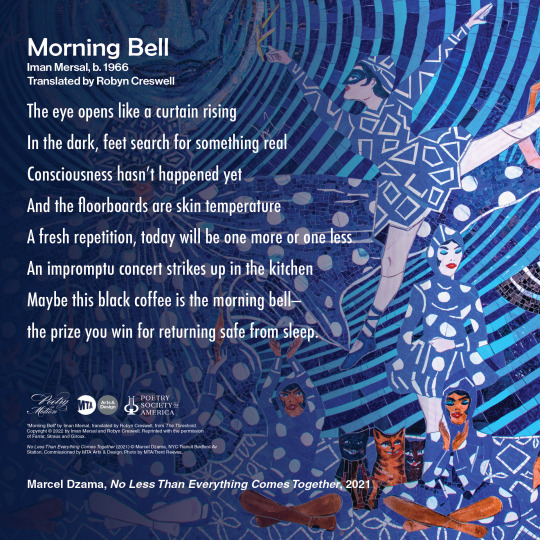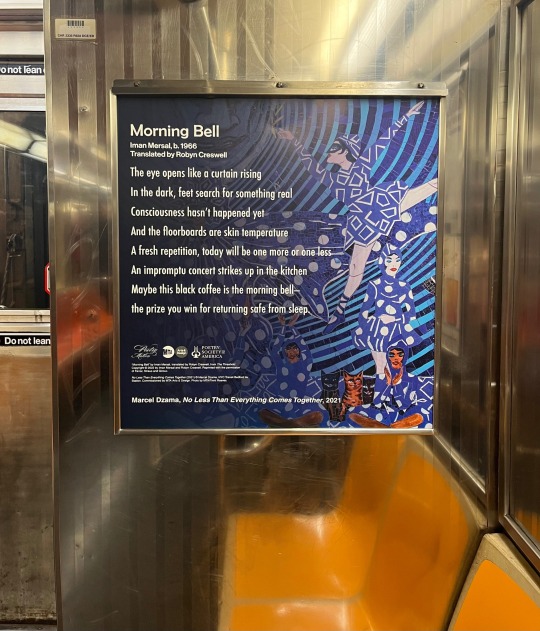#iman mersal
Text
I feel the desire to pray. I don’t know whom to address.
— Iman Mersal, from "As if the world were missing a blue window," The Threshold, tr. Robyn Creswell
#quote#iman mersal#poetry#the threshold#out of my collection#As if the world were missing a blue window#robyn creswell
701 notes
·
View notes
Text

Iman Mersal, tr. by Khaled Mattawa, from The Poetry of Arab Women: A Contemporary Anthology; “Solitude Exercises”
[Text ID: “I will hold your fingers,”]
#iman mersal#love#tenderness#excerpts#writings#literature#poetry#fragments#selections#words#quotes#typography#poetry collection#poetry in translation#arabic literature#arabic poetry
670 notes
·
View notes
Text
when i think of sleeping,
i think of dying.
i think of oblivion,
of drowning in the Nile
after baking brown in the
desert sun…
when i think of sleeping,
i am afraid
because sleep has been
such a part of me,
has taken too much–
more than its due.
i have lost centuries to this thing,
this disease of
shut-eyed nothingness.
in truth,
i don’t think it’s possible to be
safe from sleep.
because this kind of sleep
sticks to your bones,
mouths at the ridges of your throat.
this kind of sleep
eats you alive.
- Safe From Sleep, after Iman Mersal
#poetry#poem#poems#sleep#sleep disorder#excessive daytime sleepiness#sleepy bitch disease#idiopathic hypersomnia#narcolepsy#spilled ink#spilled words#spilled poetry#spilled poem#spilled writing#iman mersal
159 notes
·
View notes
Quote
Sara Elkamel: Iman [Mersal]’s poems typically take on different forms as well as registers–at times indulging in the lyric, and at times sacrificing it for the sake of a more restrained, almost academic language. She recently told me that she believes poems don’t have “forms” as much as “personalities.” Do you find you have to “get to know” a poem of hers before you approach a translation? If so, what does that process look like?
Robin Creswell: I think translation is the process—or a process—of getting to know a poem. My first versions tend to be awkward, formal, overly reliant on obvious equivalents (something like the French faux amis). That isn’t so different from the way one talks with a new acquaintance: conventions can be useful. It’s only later, and gradually, that you begin to see what makes the poem—if it’s a good poem—worth spending time with.
Robyn Creswell, from “Interview with Robyn Creswell”, published in Four Way Review, 15 September 2022
15 notes
·
View notes
Quote
Love: again. Magnificent delusion we bring to life then try to control.
Iman Mersal, The Threshold: Poems
16 notes
·
View notes
Text
The Idea of Home // Iman Mersal
I sold my earrings at the gold store to buy a silver ring in the market. I swapped that for old ink and a black notebook. This was before I forgot my pages on the seat of a train that was supposed to take me home. Whenever I arrived in a city, I felt my home was in a different one.
Olga says, without my having told her any of this, “Your home is never really home until you sell it. Then you discover all the things you could do with the garden and the large rooms—like you’re seeing it through the eyes of a broker. You stored all your nightmares in the attic, now you have to pack them in a suitcase or two.” Olga falls silent, then suddenly smiles, a monarch among her subjects, there in the kitchen between her coffee machine and a window with a view of flowers.
Olga’s husband wasn’t there to witness this queenly speech. Maybe that’s why he still thinks the house will be a loyal friend even when he loses his sight—a house whose foundations will hold steady, whose stairs will mercifully protect him from falls in the dark.
I’m digging around for a key that always gets lost in the bottom of my handbag, here where neither Olga nor her husband can see me, training myself in reality so I can give up the idea of home.
Every time you go back home with the dirt of the world under your nails, you stuff everything you could carry with you into its closets. But you refuse to define home as the resting place of junk, as a place where these dead things were once confused with hope. Let home be that place where you never notice the bad lighting, let it be a wall whose cracks keep growing until one day you take them for doors.
translated from the Arabic by Robyn Creswell
2 notes
·
View notes
Text
NTA's 2023 Poetry Longlist Includes Iman Mersal's 'The Threshold,' tr. Robyn Creswell, and Vénus Khoury-Ghata's 'The Water People,' tr. Marilyn Hacker
SEPTEMBER 1, 2023 — The American Literary Translators Association (ALTA) today announced the longlists for the 2023 National Translation Awards (NTA) in Poetry and Prose.
Although there were no Arab or Arabic titles on this year’s prose longlist, there were two on the 12-book poetry longlist: Iman Mersal’s The Threshold, translated from Arabic by Robyn Creswell, and Vénus Khoury-Ghata’s The Water…

View On WordPress
0 notes
Text
thank fucking god some of the old trains still have poetry instead of being 100% advertising hell
#like yeah theres still ad posters but its nothing like the brand new ones w the screens that olay tiktok 'cookinf hacks'#poem on todays train: morning bell iman mersal#texticles
8 notes
·
View notes
Text





Sharing a new addition to the Poetry in Motion collection!
Selected in collaboration with @poetrysociety, “Morning Bell” by Iman Mersal is set with imagery from Marcel Dzama’s mosaic “No Less Than Everything Comes Together” (2021) at Bedford Av (L) station. Dzama’s artwork, containing curious characters set in a palette of nighttime blues, was inspired by Walt Whitman’s iconic poem “Crossing Brooklyn Ferry.” A beautiful coincidence unbeknownst to the artist at the time, Whitman’s poem was part of the Poetry in Motion program’s pilot release in 1992.
Find “Morning Bell” throughout the transit system, presented in print and on digital screens throughout the subway, and on digital screens in commuter rail cars and stations.
"Morning Bell" by Iman Mersal, translated by Robyn Creswell, from The Threshold. Copyright © 2022 by Iman Mersal and Robyn Creswell. Reprinted with the permission of Farrar, Straus and Giroux. No Less Than Everything Comes Together (2021) © Marcel Dzama, NYC Transit Bedford Av Station.
Commissioned by MTA Arts & Design. Photo by MTA/Trent Reeves.
27 notes
·
View notes
Text
Iman Mersal
youtube
Iman Mersal was born in 1966 in Mit 'Adlan, Egypt. Mersal has written five books of poetry and a book of essays. Her work has been translated into Spanish, French, German, Hebrew, Dutch, and English. Mersal's creative nonfiction book Traces of Enayat al-Zayyat won the 2021 Sheikh Zayed Book Award in Literature, and her book The Threshold was shortlisted for the 2023 Griffin Poetry Prize.
#poets#poetry#writers#woman writers#arabic poetry#arab#egypt#egyptian#middle east#middle eastern writers#Youtube
10 notes
·
View notes
Text
I’m a fair-minded person.
I’ll give you more than half the air in the room
so long as you see me for what I am.
— Iman Mersal, from "Amina," The Threshold, tr. Robyn Creswell
658 notes
·
View notes
Note
OK, very very happy new year 🩵🩵 Here are 5 books: Garments Against Women, Anne Boyer; Traces of Enayat by Iman Mersal; Keats Odes by Anahid Nersessian; Penguin Book of Spiritual Verse (Ed. Kaveh Akbar); The Waste Land by TS Eliot
ooooh, thank you so much, i added the Mersal and Nersessian to my tbr!!
recs:
The Story of My Teeth, Valeria Luiselli
Voyage of the Sable Venus and Other Poems, Robin Coste Lewis
Beauty is a Verb: The New Poetry of Disability, Jennifer Bartlett (ed.)
Bonus: A Field Guide to Getting Lost, Rebecca Solnit
4 notes
·
View notes
Text

I am looking forward to the winter studio, to the promise of new cycles of ideas and to revisiting old ones.
The eye opens like a curtain rising
In the dark, feet search for something real
Consciousness hasn’t happened yet
And the floorboards are skin temperature
A fresh repetition, today will be one more or one less
An impromptu concert strikes up in the kitchen
Maybe this black coffee is the morning bell-
the prize you win for returning safe from sleep
“Morning Bell” by Iman Mersal
6 notes
·
View notes
Quote
English can do wryness, but Arabic verse has musical possibilities that I don’t think contemporary poetry in English can really capture. Because written Arabic is a literary language—it isn’t spoken except in formal situations—it’s possible to be grandly symphonic or virtuosically lyrical in a way that’s hard to imagine in English. You’d have to be a Tennyson to match the musical effects in Darwish’s late poetry, for example. But of course trying to be Tennysonian would be fatal.
With Iman [Mersal] the difficulty for an English translator is different, and I would say more manageable. In a poem about her father, she wonders whether he might have disliked her “unmusical poems.” I don’t think they’re actually unmusical (I don’t think Iman does either), but their rhythms and cadences and sounds have a lot in common with the spoken language. She writes in fusha, sometimes called “standard” Arabic, but her style shares many features of the vernacular: she doesn’t use ten-dollar words, her syntax is typically straightforward, economy is a virtue. She also uses tonal effects—sarcasm, for example—that we tend to associate with speech.
We talked a lot about “A grave I’m about to dig.” I’m still not sure Iman likes my choice of “diagonal” for the Arabic ma’ilan, to describe the way a bird falling out of the sky might appear to an observer on the ground (but that’s how I think of Iman: she sees things at a slant). The last phrase of the poem, “were it not for the sneakers on my feet” is a typical moment of self-deprecation, a comedy of casualness. There are no feet in the Arabic original, however, which just says “were it not for my sneakers” (or, more literally, “my sports shoes”). I thought adding the phrase “on my feet” was needed, both for musical reasons and because it suggests a pun that isn’t available in Arabic, where verse meters aren’t called feet. For me, Iman’s (musical, metrical) feet really do wear sneakers: they’re quick and agile, casual but spiffy. They’re what we wear today.
Robyn Creswell, from “Interview with Robyn Creswell”, published in Four Way Review, 15 September 2022
30 notes
·
View notes
Quote
You flee death into the wasteland.
Iman Mersal, The Threshold: Poems
4 notes
·
View notes
Text
Mistake // Iman Mersal
I tie my hair back
to look like a young woman you loved long ago,
always rinse away the taste
of my friends’ beer
before coming home,
and never say anything about God in your presence.
So there’s nothing you need to forgive me for.
You’re a good man. But it was a mistake to make me
think that the world is like a school for girls
and that I should set aside my desires
just to be first in the class.
translated from the Arabic by Robyn Creswell
#poetry#Iman Mersal#the Threshold#Canadian poetry#Egyptian poetry#God#feminist poetry#beer#fathers & daughters#desire#Robyn Creswell
3 notes
·
View notes